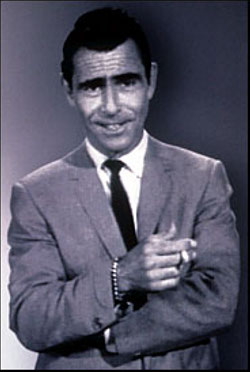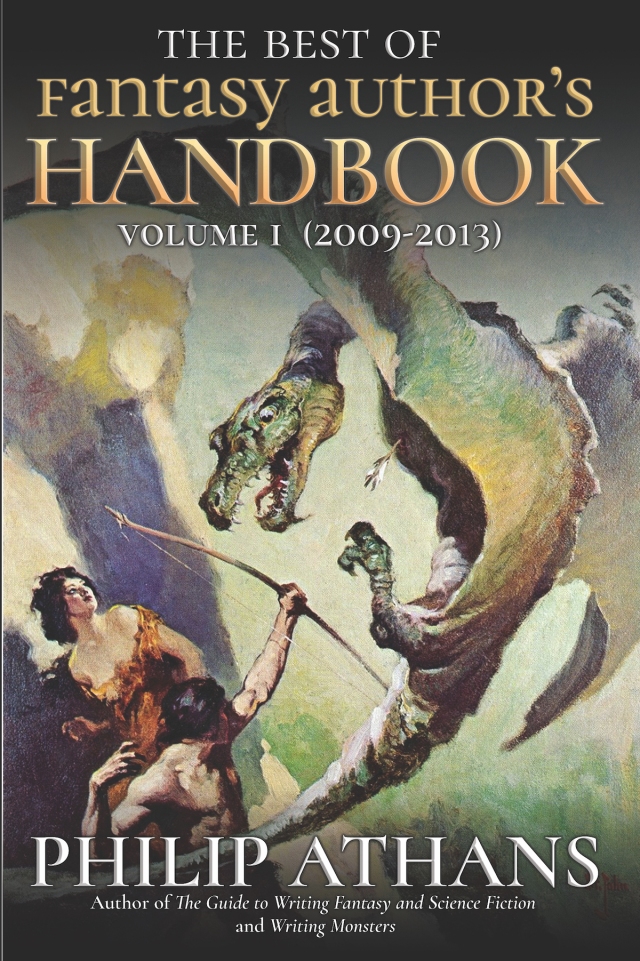In the introduction to an episode of The Twilight Zone, Rod Serling said: “It’s been said that science fiction and fantasy are two different things. Science fiction—the improbable made possible. Fantasy—the impossible made probable.”

Science tells us that thing he’s holding in his hand is most likely why he died of a heart attack at age 50.
I wrote that down a couple weeks ago and have been puzzling over it ever since. “Probable,” “possible,” I’m not sure what he was getting at or who, if anyone, said it before him.
In the end I’m happy with whatever definition of SF and/or fantasy you’re willing to provide and am delighted by both genres both in the ways they’re different and the ways they’re the same—and the third thing: the way they interact and comingle with each other. Still, it’s an interesting question and one that is certainly germane to this blog.
You may have noticed that the interviews you occasionally see here always start with the same two questions:
Please define “fantasy” in 25 words or less.
and
Please define “science fiction” in 25 words or less.
I’ve gotten some terrific answers to those questions and at risk of abandoning the basic question in the title of this post I’m happy to agree with each and every definition. But surely I have an opinion on this subject after a lifetime in the SF and fantasy business?
To me, fantasy is fiction that presents elements that are not found in the real world (technology, monsters, superhuman abilities, etc.) and the explanation for those unreal elements is some form of magic. In fantasy, things just happen because in that strange other world or alternate reality things like that (people flying around on brooms, turning into monsters, and conjuring information or energies out of thin air) just work.
Science fiction might do all those same unreal/impossible things but the explanation given is based on some kind of imagined science or technology. How did I turn into a monster? It was a virus that did it, or radiation. How am I able to fly around? It’s a jet pack cobbled together by a genius inventor. That’s science fiction.
Obviously, fantasy authors aren’t requited to show how a particular magic spell, ritual, or item actually works. If the explanation is “it’s magical,” I’m perfectly willing to buy into that, knowing full well it’s entirely invented and no matter how hard I study the text or how many live spiders I swallow I will not actually ever be able to cast a spider climb spell. I know what fantasy is and am not only able to suspend my disbelief and buy into the fiction of wizards and orcs, but excited by the prospect of doing so for however long the book, movie, or game lasts.
Science fiction, related to last week’s post, puts a slightly greater onus on the author to “get it right,” but then, only slightly. How, exactly, do the flying cars in Blade Runner work? I have no idea. And I’m perfectly willing to just think, Wow, those are cool . . . wish I had one, for the duration of the movie. I’ve said many times before that if you actually know how to get a spacecraft to travel faster than the speed of light, please at least delay your science fiction writing career and go be the Bill Gates of the FTL Revolution. For the rest of us, as long as we’re consistently applying a set of invented rules for how people interact with that FTL drive, we’re good to go.
So that being the case, what is the difference between science fiction and fantasy?
They do more or less the same thing: provide a stage for commentary on, as Douglas Adams said, “life, the universe, and everything,” by filtering sometimes very difficult subjects through myth and fable to make a point. In many ways science fiction ends with, “and this could actually come to pass,” whether “this” is a nuclear holocaust (a cautionary tale) or “this” is a galaxy-spanning Federation dedicated to the peaceful exploration of space (an aspirational tale). We didn’t quite get to the moon city and commercial space shuttles of the movie 2001: A Space Odyssey, but aside from the alien monolith what we saw in that movie was, and remains, possible. People have been building amazing gizmos since the Neolithic Period, and like we talked about last week, we’re only getting better and better—or, at least, faster and faster—at doing that so, sure, the future may very well include a moon city, FTL starships, ringworlds, and light sabers. If we could figure out how to fly, communicate over long distances, carry the sum total of all human knowledge around in our pockets, and turn the moon into a place people have been to—all of which would be impossible-to-imagine miracles to someone from the year 1014—what unimaginable miracles does the year 3014 have in store for us?
Fantasy, on the other hand, never pretends that someday you’ll be able to make a pact with demons to become an immortal vampire; that you’ll ever be able to swallow a live spider, wave your hands around, and climb on walls like Spiderman; or teleport from here to there by summoning the mana that surrounds us in all living things.
Now, having said that, someone reading this in the year 3014 will probably say, “Yeah, what? We can do all those things. My sister’s a vampire.” And watching it happen would seem, to me at any rate, like magic. The same way that I know the computer I’m using to write and publish this isn’t at all magical but a device cobbled together by my fellow non-magic-using humans, but I still don’t have a detailed understanding of how it actually works.
Maybe the difference between fantasy and science fiction is that in science fiction we blame other humans for the bad ideas they have and take credit for the good ideas, and in fantasy, good or bad, it’s the gods that did it.
I don’t know.
You tell me.
In 25 words or less.
—Philip Athans
Did this post make you want to Buy Me A Coffee…
Follow me on Twitter @PhilAthans…
Link up with me on LinkedIn…
Friend me on GoodReads…
Find me at PublishersMarketplace…
Check out my eBay store…
Or contact me for editing, coaching, ghostwriting, and more at Athans & Associates Creative Consulting?
And Fantasy Author’s Handbook is now on YouTube!
As an Amazon Associate I earn from qualifying purchases.
Editor and author Philip Athans offers hands on advice for authors of fantasy, science fiction, horror, and fiction in general in this collection of 58 revised and expanded essays from the first five years of his long-running weekly blog, Fantasy Author’s Handbook.





When I write my fantasy stories, I always have an idea of where the magic comes from. There is a process, a cost to the caster, and a source. Of course, when I write sci-fi, I also have to have enough answers to make it probable. The difference in writing it for me, then, is that one takes faith to believe and the other not so much. Magic takes more faith than science no matter what planet it’s from.
Reblogged this on AM Justice Journeys Through Time and commented:
Philip Athans’ distinction between science fiction and fantasy perfectly reflects my own views on the subject. This is why The Woern Chronicles are science fiction cloaked as fantasy–I explain the magic!
What a great post! I completely concur with your definition of the two genres. You’ve perfectly captured the distinction between the fantasy and science fiction, and defined where they overlap. Thanks for giving me something to reblog!
In sci-fi, an explanation must be assumed to exist; in fantasy, no explanation need apply.
Emotion fuels reader belief.
Many gradations exist. Sci-fi comedies (“Red Dwarf” comes to mind) where an explanation exists, but the characters fall laughably short of anything sensible. Fantasy where the characters possess fantastic intellectual rigor, making you think that their reality is explainable. Stories that suggest that magic runs our “scientific” objective reality. Stories like “Lexx” that show star-ships too advanced for any of the characters to theorize about and then add layer after layer of magic (aka Pseudo Scientific Garbage, or PSG) on top of that. Stories like “Dune” where everything runs by magic- but that’s because a little drug called Spice awakens the power in humans. At some point, the decision of genre becomes a problem for marketing, as long as the writer knows the rules of his story and entertains the reader.
I’d say, if in doubt, just find out which test panel likes your story better: fantasy fans or sci-fi.
Pingback: The 100 Best Websites for Writers in 2015
I really like that you underlined the fact that sf does not need to really explain how things work, and that the reader is required to simply believe that some technology is behind it. Defenders of hard sci-fi usually dismiss “soft” sf (or even worse, sf crossed over with magical realism) because the science doesn’t “make sense;” but if it was ever the case that hard sf had science that could actually work, we’re way pass that.
Pingback: The 100 Best Websites for Writers in 2015 | threesides
Science Fiction builds around Things and Science, Fantasy builds around Creatures and Legend
Pingback: Best Sites for Writers
Pingback: The 100 Best Websites for Writers in 2016 - SHARP FUSION
Pingback: FANTASY AND/OR SCIENCE FICTION AND/OR HORROR | Fantasy Author's Handbook